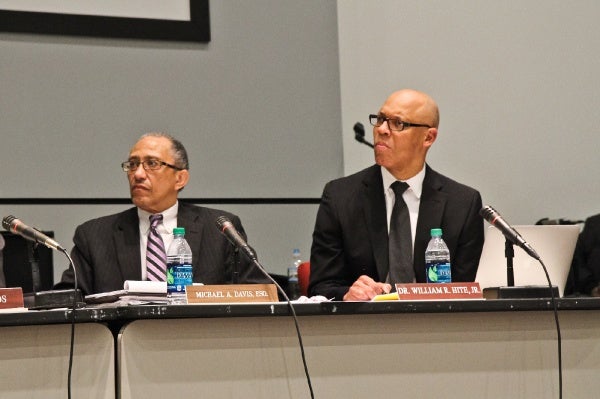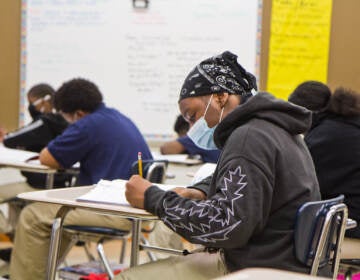School Reform Commission votes to close 23 Philadelphia schools, sparking anger and despair for students, parents, teachers
After an excruciating day of protests and pleas for mercy, Philadelphia’s School Reform Commission voted Thursday night to close 23 city schools and merge or relocate five others.
Four schools – T.M. Peirce and Bayard Taylor elementary schools, Roosevelt Middle, and Paul Robeson High – were spared.
All told, the SRC approved a total of 28 recommendations put forth by Philadelphia Superintendent William Hite, including three program relocations and a merger of the city’s two high school military academies. A total of 25 school programs will be shut down as part of the complicated set of proposals.
“It’s heart-wrenching,” said SRC Chairman Pedro Ramos. “Nobody wants to do this, much less have to do it at this scale.”
But Ramos said years of financial “gimmicks” and “kicking the can” on tough decisions had finally caught up with the district. With a projected $1.35 billion deficit over the next five years, officials say they can no longer afford to pay for 53,000 “empty seats” in half-empty school buildings across the city.
By the time the meeting was finished, the SRC had voted to close one of every ten district-managed schools in the city.
Among the casualties were Germantown, University City, and Bok Technical high schools. Supporters mounted passionate defenses of all three schools over the past few months, to no avail.
After the commission’s 3-2 vote to close University City, a large group of students and staff from the school, including cheerleaders in full uniform, hanged their heads.
“This is a fiasco! The whole city needs to be shut down!” yelled neighborhood activist Pamela Williams.
Back in December, Superintendent Hite initially placed 37 schools on the chopping block, In February, after hosting a series of community forums and considering 38 grassroots counterproposals, Hite then took 10 schools off the original closings list. But he added Beeber Middle and M.H. Stanton Elementary, whose futures will be decided by SRC votes later this spring.
Thursday’s votes came after a massive rally outside school district headquarters, headlined by American Federation of Teachers national president Randi Weingarten.
“Tonight, all across the country, everyone is watching Philly to say, ‘Will the powers that be stand up for the public schools?'” said Weingarten, standing atop a large concrete stanchion to make herself visible to the throng. “Fix our schools, don’t close them.”
Inside 440 North Broad, a group of protesters then vowed to prevent the SRC from entering the auditorium. A total of 19 people, including Weingarten and representatives from the Philadelphia Student Union and Youth United for Change, were arrested.
“They were trying to stop the SRC vote from happening because they want to save the schools from closing,” said Andi Perez, executive director of YUC.
Those arrested were held in the building, then released after being charged with summary offenses for disorderly conduct.
Once the meeting started, a mostly somber mood fell over the room.
Thirty-one speakers testified. Many simply pleaded for their schools to be kept open.
Debra Perry told the SRC she’s been teaching kindergarten at Taylor Elementary in eastern North Philadelphia for almost three decades.
“What I want to say to you, what is not part of the facts and figures, is what is at the heart of Taylor school,” she said. “We are a family.”
Perry is a 57-year old cancer survivor. She had never been to an SRC meeting before, and she wasn’t sure her voice would make a difference. But Perry said she didn’t want her school closed without making her voice heard.
“Taylor School is a place of quiet love,” Perry told the SRC. “After 27 years, I’m still amazed by the acts of love committed by our staff, for our kids.”
And then it was on to the next speaker.
Many accused the district of using faulty information to make ill-conceived or even dangerous closure recommendations. Several reiterated their call for a one-year moratorium on any closings.
“A vote to close schools tonight is uninformed and immoral,” said Rev. Alyn Waller, pastor of Enon Tabernacle Baptist Church.
A series of elected officials, including State Reps. Stephen Kinsey and W. Curtis Thomas as well as City Council members Cindy Bass, Jannie Blackwell, and Curtis Jones testified. Like many, Thomas criticized the district for the lack of detail in its plan to ensure improved educational opportunities for the 14,000 students expected to be impacted by the closings.
“At a minimum, we should not send them to schools that are as bad, if not worse, than the schools they’re coming out of,” Thomas said.
At around 7:45, the commissioners started voting. They quickly approved the closure of L.P. Hill and Reynolds elementary schools, both in North Philadelphia.
Then came T.M. Peirce Elementary.
In the first of numerous challenges to Hite’s proposals, Commissioner Joseph Dworetzky questioned the wisdom of closing Peirce, then sending an estimated 182 students to Kenderton Elementary. Kenderton was recently designated to be converted to a charter school because of its poor academic performance, meaning the district would have to pay more for each student even though they were going to a worse school.
“I’m concerned that one reason for Pierce proposal is the need to the number of students at Kenderton to an economically supportable level for a charter operator,” said Dworetzky. “If that’s the case, I regard it as very unwise.”
Commissioner Sylvia Simms, whose granddaughter attends Peirce, also reiterated her concerns about the long and dangerous walk that some of the school’s students would have to make daily if they were reassigned to E.W. Rhodes, the other option put forth by district staff.
The commission voted unanimously to spare Peirce, then quickly voted to close five other schools in North Philadelphia.
Next up was Taylor.
Dworetzky again challenged the district’s reasoning, offering hope to the Perry and the rest of the contingent from the school. He then voted to keep Taylor open.
Commissioner Feather Houston, clearly torn, asked for more time. The room — Taylor staff and parents standing with clutched hands, protestors with signs standing face to face with police — hushed.
After the unanimous vote to spare Taylor, Perry silently began to cry. “I can’t wait to go back and tell my kids they can stay,” she said.
From there on out, though, the news for schools was mostly grim. Historic Germantown High was closed. Then Pepper and Shaw middle schools in West Philadelphia. Despite months of pleas from students and impassioned testimony from supporters, University City High was closed, too.
Dworetzky called the day “draining on everybody.”
Despite his frequent challenges and nine no votes, he praised Hite for a good plan with good information.
“I think the superintendent’s team has done a good job, given how much information this process entails,” said Dworetzky.
After the meeting, Chairman Ramos said none of the commissioners was happy with being put in the position of closing two dozen schools, but said years of inaction by previous district leaders had left the commission with no choice.
“Having 53,000 empty seats has a cost,” said Ramos.
Late Wednesday, the district revealed a projection that savings from the recommended closings would total less than $3 million in net savings the first year after accounting for one-time transition costs associated with the closings. That number will be whittled down even further by sparing four schools.
But Ramos said the cash-strapped district, facing a cumulative $1.35 billion deficit over the next five years, will begin realizing significant savings in 2014-15.
“The new SRC has tried to take the position that we need to stabilize the district so we can strengthen it going forward, instead of perpetuating just limping along,” said Ramos.
This story was reported as part of a partnership in education coverage between WHYY/NewsWorks and the Public School Notebook.
WHYY is your source for fact-based, in-depth journalism and information. As a nonprofit organization, we rely on financial support from readers like you. Please give today.



















